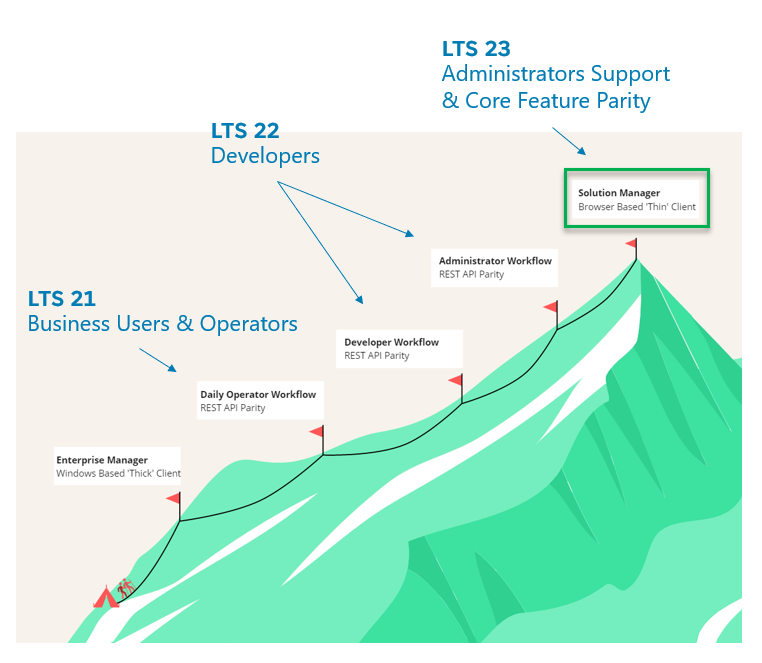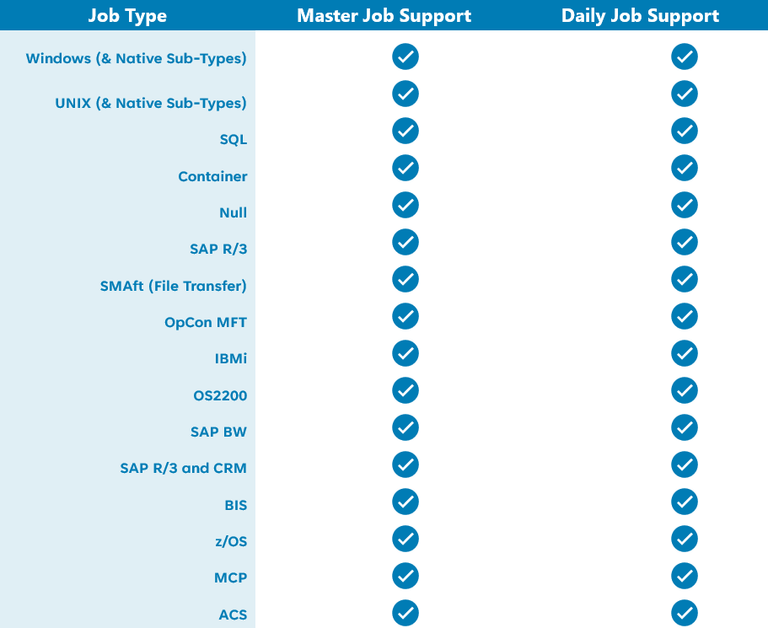OpCon LTS 23 Release Roundup
Explore all the new features and solutions that are now available with the latest version of OpCon!
LTS 23 is here! LTS stands for long-term support, and this type of release is the culmination of all the STS, or short-term support, releases that have happened over the past year.
Read on to get all the highlights for LTS 23, so you can start taking advantage of this powerful new version of OpCon!

Why upgrade to LTS 23?
With LTS 23, you can:
- Start the transition process for your users from Enterprise Manager to Solution Manager, our web-based client, which now has core feature parity across all user personas, including business users, daily operators, developers, and administrators.
- Leverage the expanded OpCon REST API to manage OpCon programmatically.
- Minimize installations and upgrades across your user base.
- Take advantage of future integrations supported by the new ACS Framework that removes the requirement of upgrading OpCon.
- Expand your automation footprint with new OpCon solutions, including MFT Server, SSO, and OpCon RPA.
- Take advantage of everything OpCon has to offer, including its newest features and tools, in the cloud.
Why should I host OpCon in the cloud?
When you host OpCon in the cloud, you can:
- Eliminate expensive hardware and software licensing fees.
- Reduce the overhead costs for maintaining machines.
- Save on costs with disaster recovery preparedness.
- Give your team even more time back to focus on more strategic work.
The OpCon Platform Journey
Together, we’ve been on a journey with the OpCon platform—one that’s been headed toward core feature parity for Solution Manager. With LTS 23, we’ve reached the summit and achieved that functional parity!

Building on support for the Daily Operator workflow with LTS 21 and Developer support with LTS 22, the LTS 23 release focuses on the Administrator persona, bringing full functional parity for end-to-end workflow with the Solution Manager client.
As we celebrate this achievement, we’re excited to announce that LTS 23 also comes with new features and frameworks that further strengthen its foundation for the future.
Let’s dig into everything new and improved that you can enjoy in OpCon with LTS 23!
Solution Manager Capabilities with LTS 23
We’ve measured our progress in terms of feature parity for our four OpCon personas: Business User, Daily Operator, Developer, and Administrator.

Business Users typically have a focus on Self-Service and are associated with a department to govern access to features, schedules, and self-service buttons that fall outside the context of the business unit.
Daily Operators are primarily responsible for daily operational tasks including the execution, monitoring, and troubleshooting of daily schedules and jobs.
Developers are primarily responsible for building new schedules and jobs along with the other events required for automating the workflow of daily schedules and jobs.
Administrators are primarily responsible for top-level configuration of the OpCon environment (i.e., server and database), its components and utilities, and other security-related features, such as user management.
Business Users can now:
- Create Self-Service buttons for users to trigger jobs on demand.
- Customize button styling and behavior to fit end-user needs.
- Control visibility and access to ensure a simple and secure user experience.
- Expand automation capabilities to other business units with minimal training.
- Expand support without additional installations with a web-based, responsive design.
- Minimize and simplify the process of managing access to sensitive applications by centralizing actions in OpCon.
Daily Operators can now:
- Build, monitor, and manage daily execution.
- Define Operational Profiles for filtering.
- Refine the Daily Processes view to fit your needs by customizing columns and filtering by Agent or Operation Profile.
- Manage Daily Schedule & Job Details. *
- Perform daily maintenance.
- Schedule checks.
- Delete daily schedules.
- Add/remove jobs from daily schedules.
- View Daily Workflow in action with the PERT view.
- Manage Daily Job events.
- View job execution history.
- Acknowledge escalated notifications.
- Leverage the Solution Manager Vision & Health modules for assistance with monitoring and execution.
Developers can now:
- Develop new workflows visually with Studio.*
- Create and manage these workflow components:
- Master Schedules*
- Master Jobs*
- Frequencies
- Thresholds & Resources
- Global Properties
- Tags
- Scripts
- Notifications & Escalations
- Leverage the OpCon Deploy module to migrate workflows across multiple OpCon environments.
- Use the OpCon REST API to programmatically leverage OpCon across multi-platform scenarios.
Administrators can now:
- Create and manage the configuration and operational status of agents/machines.
- Manage machine groups and server options, ensuring the OpCon server is configured correctly.
- Define and manage properties for remote instances of OpCon.
- Create and manage batch users, user roles and privileges, departments, access code requirements, and operational and holiday calendars.
*LTS 23 will have limited support for specific connectors. These gaps will be addressed throughout 2024. Visit the “How does this impact me and my team?” section below for a complete list of what’s currently supported.
Other Key Solution Manager Capabilities with LTS 23
- Expanded Log-Viewing Privileges
You can now use Solution Manager to provide log-viewing privileges to non-admin users.
- Modernized Reporting Capabilities
Solution Manager now includes the Audit History and Schedule and Job History reports with modern reporting capabilities like filtering and sorting.
- Centralized Access Management
Configure and manage users, roles, and privileges from one place without having to hop around to different pages.
- New OpCon Server Configuration Options
You can now manage all OpCon Server configuration options within Solution Manager.
- Access License & Support Information
Find your licensing and version information and support resources—including release notes and access to the SMA Community Portal—all in one place.
- Implement and Manage Single Sign-On (SSO)
If you host OpCon in the cloud or otherwise have the correct license, you can now manage SSO for your OpCon environment within Server Options.
- Leverage the OpCon REST API Tool
Explore the API, find out what’s possible, and try out features—all driven by your OpCon server. You’ll get real responses back based on what’s set up in your database.
New Solutions Introduced with LTS 23
Here are the new solutions that come with the latest OpCon release. All of these are included when you host OpCon in the cloud, and they can be scaled as needed to support your business’ automation goals.
First, here are the new native solutions in OpCon:
- Single Single-On (SSO)
You now have the ability to manage OpCon user access using a third-party identity management application (IDM). You can leverage the OpenID protocol with IDM support for Okta, Azure AD, or a custom SSO server.
There’s no impact to the workflow for existing users, and user role authorizations will be enforced at login. - ACS Integration Framework
The Agentless Connector System (ACS) decouple connectors from agents, employing a universal adapter for a connection-agnostic integration.
This framework simplifies the installation, management, and workflow for future integrations and allows us to build and release new integrations independent of OpCon releases.
Next, here are the add-ons and integrations available with LTS 23:
- MFT Server
MFT Server gives you the ability to host FTP and SFTP servers for the management of file transfers. This supports the mapping of CloudEvent messages for triggering OpCon events. - OpCon RPA
This client/server solution enables the capture and on-demand replay of manual web and desktop workflow recordings.
With OpCon RPA, you can orchestrate the initiation of replays using OpCon dependencies, events, and schedules or on-demand with Self Service. - Cloud Netcom Relay
This is a new integration utility that eliminates the VPN requirement for customers that host OpCon in the cloud.
A connection into your network is no longer required to support agent communication with OpCon.
OpCon Release Cycle Updates
As we continue into 2024, we’ll no longer be structuring OpCon updates as short-term support (STS) and long-term support (LTS) releases. Instead, cloud-hosted OpCon will receive a quarterly features release. Self-hosted OpCon will receive an annual features release (equivalent to an LTS release), as well as quarterly maintenance releases. We’ll continue providing hotfix support to both, and all feature releases will be supported for 36 months after their release date.

How does this impact me and my team?
If you’re a Daily Operator or Developer, Job Type and Sub-Type support will be limited to the options shown below, which will impact the types of jobs you’ll be able to create and edit within Solution Manager.

We appreciate your patience as we continue to develop new Solution Manager capabilities to bring full feature parity and scalability for large workflows.
OpCon Roadmap Ambitions for 2024
Here’s what’s planned for OpCon this year following the LTS 23 release:
- Cloud Netcom Relay
This is a new integration utility that eliminates the VPN requirement for customers that host OpCon in the cloud.
A connection into your network is no longer required to support agent communication with OpCon. - Forgot Password Workflow
This will allow users to reset their own passwords from the login page without needing administrative intervention. Administrators will still be able to reset user passwords, but they’ll no longer be the only ones able to do so. - “Otto” AI Assistant Launch
We’re in the discovery phase for an AI assistant we’re calling “Otto.” Otto will perform two major functions. First, Otto will serve as an interactive knowledge base for all things OpCon, so you don’t have to comb through user documentation to find what you need.
Second, Otto will be able to perform certain actions for you within OpCon, such as restarting a job, rebuilding a schedule, or retrieving job output. Over time, we plan to expand Otto’s capabilities. - Cloud User Analytics
We know a lot of customers will be moving to Solution Manager over the next two years, so we’ll be enhancing our user analytics along the way. We want to better understand how you use OpCon to do your job every day, so we can leverage that information to make OpCon even better. - Dedicated OpCon RPA Client
The next phase for OpCon RPA is to have a standalone client that’s simplified and targeted for RPA. Like our other agents and connectors, you’ll be able to create an OpCon RPA job type in Solution Manager and execute replays of the tasks you record with the client.
With the release of this dedicated client, we also plan to roll out solutions for any usability issues, as well as new features designed to make the process more efficient. - Usage Data & ROI
We want to centralize usage data within Solution Manager, so you can access it on demand without having to reach out to your CSM every time you want to check that data.
By layering in usage and ROI data into Solution Manager, you’ll be able to better quantify the value of OpCon provides your organization every day. - Customizable Dashboards & Reporting
These customized dashboards and reporting capabilities will make OpCon even easier to use, so we can help you increase the value of your automation.
In addition to these strategic feature goals, we’ll also progress tactically on these items throughout 2024:
- Solution Manager user experience enhancements
- Solution Manager workflow and feature parity gaps
- ACS Framework Connector parity and new integrations
- Managed File Transfer client and server enhancements
Next Steps
Now that you have the rundown on LTS 23, here are some next steps you can take!
If you’re interested in:
- Upgrade assistance
Reach out to your Customer Success Manager - Learning more about the release
Check out the additional resources linked below and/or connect with your Customer Success Manager or Consultant. - Hosting OpCon in the cloud
Reach out to your Customer Success Manager.
Additional Resources
“Exploring the OpCon LTS 23 Release” webinar recording
“Exploring the OpCon LTS 23 Release” webinar deck
“Exploring the OpCon LTS 23 Release” webinar Q&A follow-up
